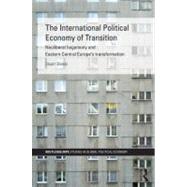- ISBN: 9780415386692 | 0415386691
- Cover: Hardcover
- Copyright: 5/11/2012
The collapse of Soviet state-socialism over a decade ago ended the Cold War in Europe and created an opportunity for the unification of the divided continent. This dramatic development was generally welcomed across Eastern Central Europe (ECE) as the states of the region embarked on reforms that introduced forms of liberal democracy and market economy. Politically, 'transition' was fuelled by ideals of liberal democracy, freedom and 'civic society', while economic changes were accompanied by a widespread popular belief that the introduction of a market economy via neoliberal 'Shock Therapy' would lead to a rapid and straightforward closure of the wealth gap with the West. 15 years later and the emerging political economy of the 'New Europe' is marked by growing economic, political and social fragmentation and dislocation. This is an inquiry into transnationalisation that explores this key theme in International Political Economy (IPE) in the context of transition in Poland. Material from the other ECE states widens the parameters of the discussion but the book maintains a clear, leading focus on Poland as the exemplar transnationalised state in ECE. The book proposes that the post-communist transition in Poland can profitably be understood through the concept of the transnationalisation of the state whereby national policies and practices are adjusting to the exigencies of the global economy with particular state apparatuses buttressing the changes in the spheres of production and finance. Poland, as the ECE pioneer of neoliberal change, in the form of Shock Therapy, is indicative of wider changes in the political economy of other transition states especially with the added pressure of EU enlargement. The hypothesis (against the thrust of the current literature) is that transition is embedded in structural and historical conditions generated by 'external', transnational forces and trends. It argues that change in ECE has predominately been explained as a 'domestic' process with few attempts made to contextualise the changes taking place in the region as part of neoliberal globalisation. To remedy this, the book explores the restructuring of the Polish state since 1989 by connecting concrete instances of policy to broader historical processes, social structures and political economy.






